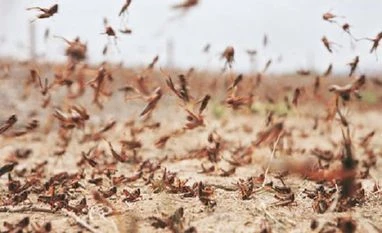After damaging crops in Rajasthan and Madhya Pradesh, swarms of locusts entered Uttar Pradesh's Jhansi district Wednesday and could head towards Maharashtra's Ramtek city amid what is being described as the worst attack in 26 years.
Punjab, usually unaffected by the menace, is also gearing up for the possibility of a locust attack.
"It is not a new problem and we had been facing it for a long time. This year, the locusts attack is the worst in 26 years,” an official at the Faridabad-based Locust Warning Organisation (LWO) told PTI.
According to the Union agriculture ministry, 21 districts in Rajasthan, 18 in Madhya Pradesh, two in Gujarat and one in Punjab have undertaken locust control measures till now.
Rajasthan on Wednesday deployed a drone to spray pesticide on locusts in Jaipur district's Samod area and the Union ministry said it too is acquiring the machines.
The LWO official said there is a coordinated effort to contain the locust spread.
Earlier, locusts have been confined to Rajasthan and Gujarat. Since the insects are not finding enough food to survive, they are moving to other areas with the help of strong winds, he said.
According to the Indian Council of Agricultural Research Director General Trilochan Mohapatra, the insects have attacked about 40,000 hectares of land.
But there is no impact on rabi crops like wheat, pulses and oilseeds as most of them are harvested by now.
"The focus now is to stop the outbreak prior to arrival of monsoon rainfall in June-July when locusts will mature and breed. If the infestation is not controlled, it will pose a threat to kharif crops," he said.
A swarm reached Jhansi district on Wednesday, an Uttar Pradesh official said. Other districts in the region are also on alert.
Locusts struck the same district last week as well, but authorities said they eliminated half of that swarm with the help of local people.
The latest swarm was spotted in neighbouring Madhya Pradesh's Datia district.
Anticipating its arrival, Jhansi administration had already deployed fire brigade vehicles loaded with pesticide and taken other measures.
The locusts reached Skill village in Garautha tehsil around 4.30 pm, Jhansi division's Deputy Director Agriculture Kamal Katiyar told PTI.
The swarm is spread over an area of about one square kilometre.
"A relatively small swarm of locusts was also spotted in Datawali village under Samthar police station area,” Katiyar said.
In Maharashtra, officials said swarms that had entered Katol and Parseoni in Nagpur district over the last four days might now move towards Ramtek city.
It is, however, difficult to predict their exact flying course, an agriculture department official said.
The swarms, stretching up to 17 km, had first entered farms in Nagpur district's Katol and Wardha's Ashti taluka on Saturday night and Sunday, damaging orange and vegetable plantations.
The locusts then moved towards Parseoni tehsil on Monday night.
"These swarms are moving towards Ramtek or Mouda (in Nagpur district). However, one cannot say for sure where the swarms of locusts will descend,” Ravi Bhosale, Divisional Joint Director in Agriculture Department, said.
“They might fly in the direction of Ramtek or might change the course, as they fly as per the flow of wind," he added.
Punjab fears it could be a target.
"An alert has been issued in whole Punjab," Agriculture Director Sawtantar Kumar Airi said.
Control rooms have been set up in each district and farmers asked to report any locust activity, he said.
Locusts were spotted in some villages in Punjab's Fazilka and Muktsar districts in January but were effectively contained then.
The current attack began last month when swarms entered Rajasthan from Pakistan, and then spread to other western states.
Unlock 30+ premium stories daily hand-picked by our editors, across devices on browser and app.
Pick your 5 favourite companies, get a daily email with all news updates on them.
Full access to our intuitive epaper - clip, save, share articles from any device; newspaper archives from 2006.
Preferential invites to Business Standard events.
Curated newsletters on markets, personal finance, policy & politics, start-ups, technology, and more.
)